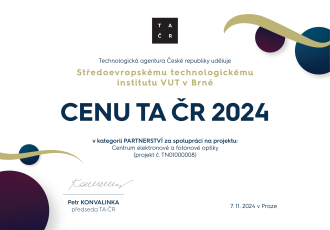20. Nov. 2024
The Centre for Electron and Photon Optics brings together all key academic and industrial players in the Czech Republic involved in research and development in electron and photon optics. The project’s researchers include a team of scientists from CEITEC BUT, CEITEC MUNI and the Centre for Sensing, Information and Communication Systems (SIX) from the Faculty of Electrical Engineering and Communication (FEEC) BUT. The Centre was founded on deep collaboration between academic and industrial partners, which is often presented as difficult to implement. It was the successful interconnection and very close cooperation of the individual consortium members that led to the Centre becoming the winning project awarded the TA ČR Prize in the Partnership category.
For the twelfth time, the Technology Agency of the Czech Republic (TA ČR) awarded the best applied-research projects for the past year. The theme of the TA ČR Day 2024 was 15 years of the TA ČR, and so the celebration of this important anniversary of the Agency was added to the celebration of Czech applied research.
The gala evening with the awarding of the TA ČR Awards to the best applied-research projects for the past year was traditionally held in the historic building of the National Museum in Prague. The awarded representatives of the winning projects took home an original glass sculpture by the Czech designer Lukáš Jabůrek. “The TA ČR awards go to the past year’s best quality applied research projects. The award is meant to be a form of motivation to maintain and encourage further cooperation in the field of applied research. We award projects in four categories – BUSINESS, PARTNERSHIP, SOCIETY and GOVERNANCE. And the public decides who receives the fifth Czech Idea Award,” says Petr Konvalinka, Chairman of TA ČR.
Scientists from CEITEC BUT, together with colleagues from CEITEC MUNI and SIX FEEC, celebrated their success in the Partnership category. They are among the researchers of the project of the Centre for Electron and Photon Optics, thanks to which we can observe or get to know atoms, molecules or individual cells and what happens in them in ever greater detail while at the same time, it allows us to work in this world. Thanks to tools such as lasers or electron beams, we can manipulate atoms or molecules to change the properties of surfaces and structures of materials, for example, as required. The broad scope of the project offered space for the involvement of several teams from both academia and industry, among which we should mention in particular the principal investigator, the Institute of Instrumentation of the CAS, v. v. i., and industrial partners Meopta, Thermo Fisher Scientific, Crytur, and others.
In the course of the project, a complementary synergy was created between the partners, which brings the many years of bilateral cooperation and the acquired experience of the participants to a level that pushes the boundaries of individual fields, creating new jobs and significantly increasing the added value of the related industrial production. The work of the experts in this project has produced a total of 220 results, including 107 working samples, 20 proven technologies and 3 software products.
“The research tasks in the project focused, for example, on the standardisation of new procedures and methodologies, or the development of methodologies for measuring various physical quantities with new and innovative procedures. The individual teams often dealt with the implementation of ideas arising from the findings of basic research (e.g. observation of magnetic contrast in a scanning electron microscope or the creation of optical elements using metasurfaces),” says Miroslav Kolíbal, the main coordinator of the project for BUT.
The members of the project consortium met quite often. A fundamental criterion for selecting individual research tasks was the reasoned and broad collaboration between multiple research teams within the centre. Thus, very close collaboration across the consortium developed, initially forced but then spontaneously. This is probably also why the project was awarded in the “Partnership” category. The prize was accepted by Ilona Müllerová, Vice President of the Academy of Sciences, the principal investigator of the project.
The quality of the results of the project is also evidenced by the successful application for follow-up support from TA ČR, and the NCK CAEPO project is currently underway, which also includes new participants in the consortium.
In the context of electron microscopy, the main TAČR prize was awarded at the CEITEC BUT in the past. The same team participated in the newly awarded Centre.


 Share
Share






